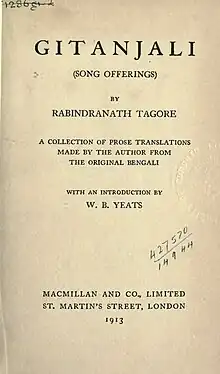 Title page | |
| Author | |
|---|---|
| Original title | গীতাঞ্জলি |
| Country | India |
| Language | Bengali |
| Subject | Devotion to God |
| Genre | Poem |
Publication date | 4 August 1910 |
Published in English | 1912 |
| Pages | 104 |
| Text | Gitanjali at Wikisource |
Gitanjali (Bengali: গীতাঞ্জলি, lit. ''Song offering'') is a collection of poems by the Bengali poet Rabindranath Tagore. Tagore received the Nobel Prize for Literature in 1913, for its English translation, Song Offerings, making him the first non-European and the first Asian & the only Indian to receive this honour.[1]
It is part of the UNESCO Collection of Representative Works. Its central theme is devotion, and its motto is "I am here to sing thee songs" (No. XV).[2]
History
The original Bengali collection of 156/157 poems were published on 4 August 1910. The poems were based on medieval Indian lyrics of devotion with a common theme of love across most poems. Some poems also narrated a conflict between the desire for materialistic possessions and spiritual longing.[3]
Reworking in other languages
The English version of Gitanjali or Song Offerings/Singing Angel is a collection of 103 English prose poems,[4] which are Tagore's own English translations of his Bengali poems, and was first published in November 1912 by the India Society in London. It contained translations of 53 poems from the original Bengali Gitanjali, as well as 50 other poems from his other works.[5] The translations were often radical, leaving out or altering large chunks of the poem and in one instance fusing two separate poems (song 95, which unifies songs 89 and 90 of Naivedya).[6] The English Gitanjali became popular in the West, and was widely translated.[7]
References
- ↑ "Gītāñjali | poetry by Tagore". Encyclopedia Britannica.
- ↑ "Summary of Gitanjali by Rabindranath Tagore| Kaitholil.com". kaitholil.com. Archived from the original on 2022-12-10. Retrieved 2022-07-30.
- ↑ "Gītāñjali | poetry by Tagore". Encyclopedia Britannica.
- ↑ "Gītāñjali | poetry by Tagore". Encyclopedia Britannica.
- ↑ Ghosal, Sukriti. "The Language of Gitanjali: the Paradoxical Matrix" (PDF). The Criterion: An International Journal in English. Retrieved 14 August 2012.
- ↑ Sukriti. "Gitanjali: Song Offerings". Retrieved 8 April 2017 – via Google Books.
- ↑ Gitanjali: Selected Poems (2010-07-30). "Gitanjali: Selected Poems". School of Wisdom. Archived from the original on 2012-07-21. Retrieved 2012-07-11.
External links
 Media related to Gitanjali at Wikimedia Commons
Media related to Gitanjali at Wikimedia Commons Works related to Gitanjali at Wikisource
Works related to Gitanjali at Wikisource- Gitanjali at Standard Ebooks
.jpg.webp)